Content navigation
Universities and Federal Institutes of Technology
In Switzerland, there are twelve universities that are accredited in accordance with the Federal Act on Funding and Coordination of the Higher Education Sector (HEdA): ten cantonal universities and two Federal Institutes of Technology (FIT) in Zurich and Lausanne. These are traditional academic universities and primarily conduct basic research, in contrast to universities of applied sciences, which primarily conduct application-oriented research.
The universities in Basel, Bern, Lucerne, St. Gallen and Zurich, as well as the Swiss Federal Institute of Technology Zurich, are located in German-speaking Switzerland, the universities of Geneva, Lausanne and Neuchâtel and the Swiss Federal Institute of Technology Lausanne in French-speaking Switzerland. The university of Fribourg is located in the bilingual canton of Fribourg (French and German), the Università della Svizzera italiana (USI) in the Italian-speaking canton of Ticino.
The universities offer a wide range of degree programmes.
Study at Bachelor level
-
The cantonal universities and Federal Institutes of Technology require a Baccalaureate certificate or an equivalent qualification, as well as proficiency in the language of study, as terms of admission to a Bachelor course. The respective university determines the specific terms of admission.
In Switzerland, all fields of study are freely accessible, apart from a few exceptions (medical degree programmes, chiropractic and, in some cases, sports sciences). For degree programmes with entrance exams, a decision is made each year as to whether to hold entrance exams, based on the number of applications. Due to the limited number of places in these programmes, foreign students are not admitted to them apart from in special cases.
Holders of a Federal Vocational Baccalaureate or a Specialised Baccalaureate who have passed a university aptitude test in accordance with the relevant regulation are also admitted to universities.
Various universities allow alternative admission procedures for those who do not fulfil the aforementioned terms of admission, whereby a certain age, professional experience, a written application and an additional aptitude test may be required.
Study at Master level
-
Those wishing to enrol in a Master course must first successfully complete a Bachelor course. The Master course can be taken at the same university as the Bachelor course, or at a different one. In principle, it is also possible to change the field of study. The enrolling university can demand the acquisition of additional knowledge and skills before admission. Transfer from a different type of tertiary level institution to a university requires certain conditions to be met and additional activities to be performed.
Doctorate
-
A Master's degree and the fulfilment of additional conditions are prerequisites for admission to a doctorate course. The respective university is responsible for admission. If the academic qualifications are sufficient, admission is also possible with a Master's degree from another type of tertiary level institution.
Study at Bachelor level and Master level
-
Education follows the two-tier study model of Bachelor's and Master's degrees in accordance with the Bologna Declaration.
The Bachelor course requires 180 ECTS points. The standard duration of a full-time study course is three years. For the Master course, another one-and-a-half to two years of full-time study, i.e. 90 to 120 ECTS points, are necessary.
Names and abbreviations of the acquired titles
-
- Bachelor of Theology – B Th
- Master of Theology – M Th
- Bachelor of Law – B Law
- Master of Law – M Law
- Bachelor of Arts – B A
- Master of Arts – M A
- Bachelor of Science – B Sc
- Master of Science – M Sc
- Bachelor of Medicine – B Med
- Master of Medicine – M Med
- Bachelor of Dental Medicine – B Dent Med
- Master of Dental Medicine – M Dent Med
- Bachelor of Veterinary Medicine – B Vet Med
- Master of Veterinary Medicine – M Vet Med
Doctorate
-
A doctorate requires a comprehensive personal research project, provides preparation for research- oriented activity inside or outside the university domain and engenders the ability to assume demanding professional tasks and roles. A doctor's degree can only be awarded by a university. Upon achieving a doctorate, the title Dr. (…) is acquired; this corresponds to the abbreviation PhD.
Continuing education and training
-
The universities' mandate includes not only education, but also continuing education and training. Each university operates a continuing education and training service, which is responsible for providing continuing education and training courses and degree programmes. The continuing education and training degree programmes include MAS, DAS and CAS degree programmes. The universities award the corresponding degrees to the participants (Master of Advanced Studies, Diploma of Advanced Studies and Certificate of Advanced Studies).

